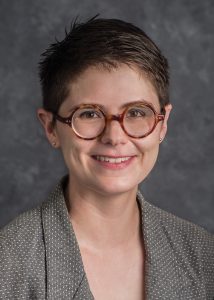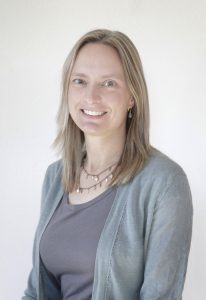21 July 2016
WASHINGTON, D.C. – Journalists Lizzie Wade and Alexandra Witze have been awarded top honors from the American Geophysical Union for their reporting in the Earth and space sciences.
AGU recognizes Science correspondent Lizzie Wade with the 2016 Walter Sullivan Award for Excellence in Science Journalism – Features for an in-depth story on the “convulsive” geological changes that underlie the Amazon’s biological diversity. Nature correspondent Alexandra Witze receives the 2016 David Perlman Award for Excellence in Science Journalism – News for her story describing research into the swarms of earthquakes rocking Oklahoma over the last few years.

Lizzie Wade receives the 2016 Sullivan award for her story, “How the Amazon became a crucible of life,” published in Science on 28 October 2015. Credit: David Sharpe
The Walter Sullivan Award, named for the late, renowned New York Times science writer, honors excellence in science feature writing for work prepared with a deadline of more than one week. Wade has been named the winner of the 2016 award for her story, “How the Amazon became a crucible of life,” published in Science on 28 October 2015. The award comes with a $5,000 prize and a plaque.
Wade’s story is “a majestic piece, successful in its efforts to sketch the history, or possible histories, of an enormous and important part of our planet”, according to the Sullivan award committee. “Beautifully reported and well written, the story focuses on a cast of scientist characters who are struggling to account for the sometimes baffling physical and biological records left by rising mountains, shifting rivers, and changing coastlines,” the committee added.
“Wade bridges geological sciences, ecology, and evolutionary biology to illustrate the integral connections of these disciplines,” according to the judges. “Ultimately, competing scientific theories about the geological history of the Amazon are unresolved in her piece, but Wade still leaves her readers satisfied, understanding more about the process of science and the character of scientists.” The committee noted that Wade’s writing is “lively and interesting,” and the judges were impressed with the scope of her on-the-ground reporting and background research.

Alexandra Witze receives the 2016 Perlman Award for her story, “Race to unravel Oklahoma’s artificial quakes,” published in Nature on 21 April 2015.
Alexandra Witze receives the 2016 David Perlman Award for Excellence in Science Journalism-News for her story, “Race to unravel Oklahoma’s artificial quakes,” published in Nature on 21 April 2015. The David Perlman Award, named for the distinguished San Francisco Chronicle science editor, recognizes work published with deadline pressure of one week or less, and comes with a $5,000 stipend and a plaque.
Witze’s story provides readers with an accessible look at the current debate and science around human-induced earthquakes in Oklahoma, a controversial topic that affects many people in the region, according to the Perlman award committee. “The article provides an informative and engaging perspective on the causes of increased seismic activity in Oklahoma in recent years,” according to one judge. “It effectively synthesizes information from several sources and brings to light new insights on the controversial topic of human-induced earthquakes.”
In commending the story, one Perlman award committee member said: “The article gave readers a very accessible view of an important and complex topic using an excellent balance of in-the-field reporting and clear descriptions.” One judge noted that the article was “nicely balanced, in terms of looking at the opposing viewpoints … and getting in depth on some of the different viewpoints on this topic” while another “liked the broad array of sources, and the way the author used examples to explain things, rather than just explaining them using expository text.”
The two AGU journalism awards will be formally presented during AGU’s annual Honors Ceremony on Wednesday, 14 December 2016, as part of the 2016 AGU Fall Meeting in San Francisco.
###
The American Geophysical Union is dedicated to advancing the Earth and space sciences for the benefit of humanity through its scholarly publications, conferences, and outreach programs. AGU is a not-for-profit, professional, scientific organization representing more than 60,000 members in 139 countries. Join the conversation on Facebook, Twitter, YouTube, and our other social media channels.
Nanci Bompey
+1 (202) 777-7524
[email protected]